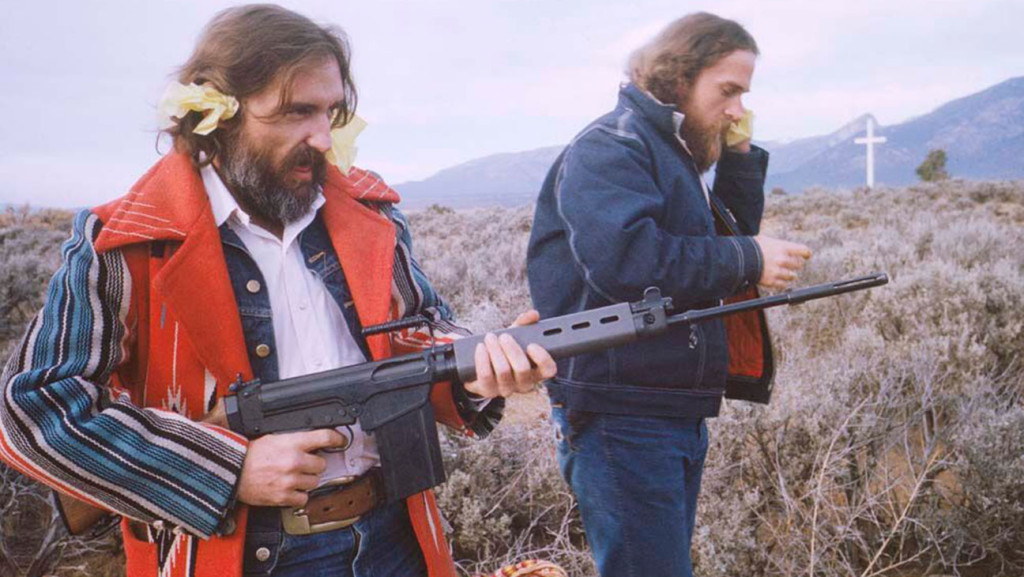The American Dreamer Review
 Dennis Hopper‘s long gestating 1971 film, The Last Movie was supposed to be great. It was supposed to be the film that launched Hopper’s career as a serious director. And it was supposed to justify the $1 million budget he was given to make it, following the success of Easy Rider. This was not to be though, and whilst The Last Movie is an engaging and intriguingly enigmatic film, it was not the critical and commercial success many, including Hopper, hoped it would be.
Dennis Hopper‘s long gestating 1971 film, The Last Movie was supposed to be great. It was supposed to be the film that launched Hopper’s career as a serious director. And it was supposed to justify the $1 million budget he was given to make it, following the success of Easy Rider. This was not to be though, and whilst The Last Movie is an engaging and intriguingly enigmatic film, it was not the critical and commercial success many, including Hopper, hoped it would be.
During The American Dreamer, a documentary on Hopper made during the production of The Last Movie, Hopper addresses the thorny issue of whether the film will be “accepted”. He’s confident that it will be and even that it will be “better than Easy Rider“. But even if it’s not, he’s confident that it will then be remembered in the same way that The Magnificent Ambersons is, even going so far as to draw direct parallels between himself and Orson Welles.
Grand claims from a director in the midst of the highly troubled production of only his second film. But are we hearing the real thoughts of Dennis Hopper, the director or is this Dennis Hopper, the actor, playing a director?
The American Dreamer directors Lawrence Schiller and L.M. Kit Carson have been relatively forthcoming since the film’s initial, highly limited release about the fact that a significant amount of the documentary was staged and that Hopper was very much involved in shaping the film – he’s even credited as a co-writer.
What is perhaps most interesting about The American Dreamer is that it feels very much like a performance piece by Hopper and not a genuine document. And, crucially, that this doesn’t detract from the film’s position as an fascinating portrait of Hopper at this time. What he wants to present to world through this film provides a great deal of insight into his character and The American Dreamer also acts, viewed from 2016, very much like a time capsule of a very precise moment in American culture.
Hunter S. Thompson‘s Fear and Loathing in Las Vegas was also published in 1971 and in it Thompson famously wrote,
So now, less than five years later, you can go up on a steep hill in Las Vegas and look West, and with the right kind of eyes you can almost see the high-water mark—that place where the wave finally broke and rolled back.
This infamous ‘wave speech’ has become iconic in its reference to the end of the hippy movement and the change that occurred throughout American culture at the end of the sixties and into the seventies. This is the period through which Hopper is living and he was arguably one of its most iconic figures. But times were changing and The American Dreamer provides a intriguing window into this moment.
In one sequence we see Hopper talking about visiting Manson in prison, he frolics with playmates – shipped in by the film’s directors – has a staged bathtub orgy and tells a journalist that he thinks he’s probably a lesbian. And in a number of scenes he shoots guns, which were, it seems, something of a fixation of Hopper’s. It’s often incredibly awkward and even sad to watch, as the rambling voiceovers are to listen to, and it feels like you are witnessing the hippy dream unravel in front of you, as it’s slowly revealed as now bogus and forced. And perhaps even rotten.
The American Dreamer may not have been the myth-making doc that those involved seemed to be shooting for, but it’s ultimately a far more interesting and arguably worthwhile document in an entirely different way. A captivating view of the wave rolling back and crashing hard against the rocks.
The American Dreamer is now streaming worldwide, exclusively on Mubi.